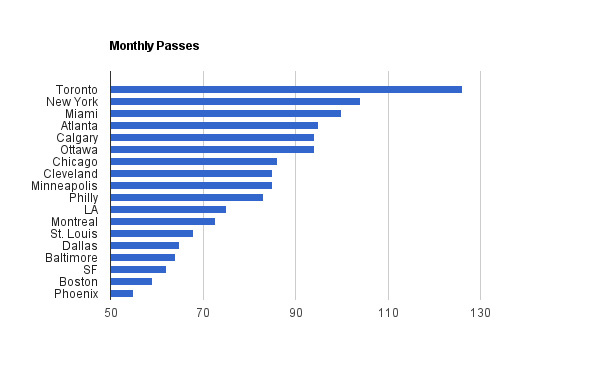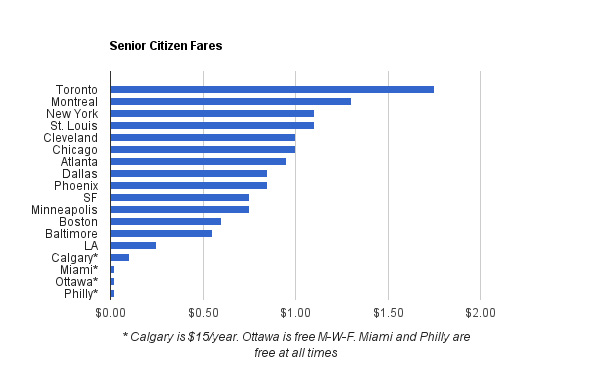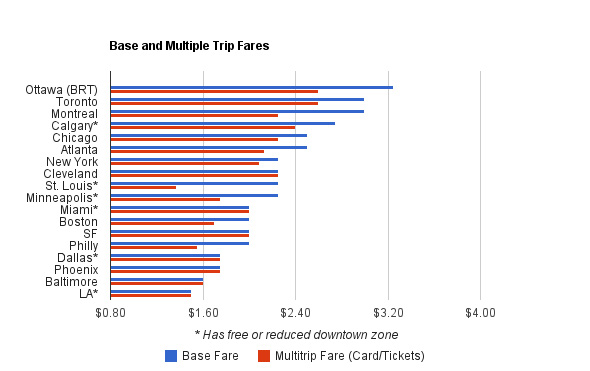
Is the TTC the priciest transit system in North America?
Toronto is a unique city, and so is its public transit system. Few other places in North America offer quite the same mix of subway, streetcar and bus transit, all tied together by a single fare. But there are parallels and similarities out there if you look closely enough. Boston and Philadelphia offer perhaps the closest match of a smallish subway network mixed with legacy streetcar lines, and San Francisco closely mirrors the political tensions of the TTC, Metrolinx and GO with its Muni, BART and Caltrain mash-up.
Montreal and Washington DC have similar rapid transit ridership, while Los Angeles near-identical bus numbers. Yet in the big picture, the greatest commonality between systems relates to fares. All cities have to charge a rider to get from point A to point B, and many grapple with funding sources, labour issues, service levels, local politics and other factors that would sound familiar to even the casual transit observer. After suffering three years of deep recession, even well-regarded American cities have been raising fares and slashing service. Everyone is the same unfortunate situation of having to pay too much for transit... or are they?
It's fairly common knowledge that the TTC gets more funding from the farebox (67%) than any other North American transit system, so one would suspect its fares are relatively high in relation to other cities, but oddly this argument rarely gets mentioned during council debates or most articles covering the topic of fare hikes.

It can be very difficult to peer over the edge of the putative centre of the universe, after all, even in the age of Google. Besides a willingness to acknowledge that other cities actually exist, many assumptions are required to undertake a comparative study of transit fares (see below), and any general comparison will surely skim over some pertinent details. But the question must still be asked — in the afterglow of the latest TTC fare hike, how does Toronto transit stack up when it comes to fares?

The answer turns out to be an "F," by almost any measure. Although riding the Rocket in Toronto was less expensive than, say, New York as recently as 1990, ever since, the TTC has sat on top of the fare heap. In three of the four most easily compared fare categories for major North American transit systems — the adult base fare, the adult discounted multi-trip fare, the senior reduced fare and adult monthly passes — the TTC comes up as the most costly ride. The sole exception is the adult base fare, where Toronto runs a close second to Ottawa (which says something about public transit funding in Ontario). When measured overall across the categories in question, the TTC is the most expensive single-fare integrated transit system in North America.

Given that context, is a fare increase for any reason reasonable in Toronto? Or does this show that something else is fundamentally broken on either the cost or revenue side that is driving TTC fares through the roof? There are multiple reasons for the the TTC's monetary woes to be sure — including a lack of provincial funding — but were the comparative position of its fares better represented by the Toronto media and at public meetings, one has to wonder if more pressure could be brought to bear on improving funding and reducing expenses to better protect the farebox. Surely the title of "most expensive transit" is one a striving world-class city would prefer not to keep. Spread the word.
Study Assumptions:
- Most North American transit systems use a single fare within their borders, like the TTC. But there are those which do not, like Washington DC, Pittsburgh, Houston, Denver, Portland, Seattle and Vancouver. It would be apples to oranges to compare these directly with the TTC, since they are both less expensive for close-in residents and more expensive for those in the outer suburbs. Generally speaking, almost all are less costly than the TTC within their city limits, and some even include free fare areas downtown. But for the purpose of this study they have to be excluded.
- Student fares are far too varied in format and age limits to easily compare, but all cities offer some sort of senior fare that is easily compared. Equalizations had to be made for Calgary and Ottawa (see chart).
- Smart farecards are now found systemwide in all cities listed here except Toronto, Cleveland and Philly. But these cities still offer discounted fares in the form of multiple-trip cards or tokens/tickets, which are directly comparable to smartcard discount fares.
- Separate costs for transfers are difficult to equalize. These are now rare in most places and usually waived for smart farecards. They are ignored here for simplicity, though it should be noted they would significantly increase the cost of a single trip in Miami (50 cents) or Philadelphia ($1).
- Where different prices for bus vs subway do still exist, as in Boston or St. Louis, the rail fare was used. For Ottawa the bus price was used as this city's transit is primarily BRT — its small demonstration rail line is actually less expensive to ride but carries only 2% of daily ridership and so is ignored.
- All cities now offer monthly adult passes for bus and subway/LRT. In some cities, such as Philadelphia, these are even good for partial use of the commuter rail lines though this was ignored in the comparison.
- Cities with small transit ridership or nascent rail transit lines were left out of the comparison.
- Exchange rate of par assumed for simplicity. Even at an 85 cent Canadian dollar the results would still hold valid.
Guest contribution from Larry Green.
Photo by Cameron MacMaster in the blogTO Flickr pool
Latest Videos
Latest Videos
Join the conversation Load comments







